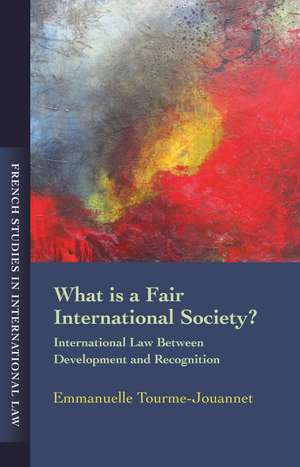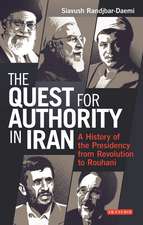What is a Fair International Society?: International Law Between Development and Recognition: French Studies in International Law
Autor Emmanuelle Tourme Jouanneten Limba Engleză Paperback – 13 aug 2013
Preț: 304.94 lei
Preț vechi: 373.52 lei
-18% Nou
Puncte Express: 457
Preț estimativ în valută:
58.35€ • 61.09$ • 48.28£
58.35€ • 61.09$ • 48.28£
Carte disponibilă
Livrare economică 17-31 martie
Preluare comenzi: 021 569.72.76
Specificații
ISBN-13: 9781849464307
ISBN-10: 1849464308
Pagini: 252
Dimensiuni: 156 x 234 x 15 mm
Greutate: 0.36 kg
Ediția:New.
Editura: Bloomsbury Publishing
Colecția Hart Publishing
Seria French Studies in International Law
Locul publicării:London, United Kingdom
ISBN-10: 1849464308
Pagini: 252
Dimensiuni: 156 x 234 x 15 mm
Greutate: 0.36 kg
Ediția:New.
Editura: Bloomsbury Publishing
Colecția Hart Publishing
Seria French Studies in International Law
Locul publicării:London, United Kingdom
Caracteristici
This book explains how international law is shifting towards the recognition of socio-economic justice as its foundation.The book is written by one of the world's leading international law scholars.The historical perspective offered in the book explains international law's trajectory towards 'fairness'.
Notă biografică
Emmanuelle Tourme-Jouannet is now Professor at Sciences Po Law School, Paris. Her main publications include Le droit international (Paris, PUF, Collection 'Que sais-je ?', 2013) The Liberal-Welfarist Law of Nations. A History of International Law (Cambridge University Press, 2012) and Emer de Vattel et l'émergence doctrinale du droit international classique (Paris, Pedone, 1998).
Cuprins
Introduction Part I: International Law and Development: An Equitable International Society? 1 Classical International Law and Development I The Development Paradigm A The Development Era B Disagreements over Development. Theories of 'Underdevelopment' II The Emergence and Evolution of International Development Law - NIEO A Classical International Development Law B The Third World: A Reformist Project for the World C The New International Economic Order (NIEO) III Ultraliberal Reaction and the Impact of Economic Globalisation A The NIEO Abandoned and the Neoliberal Model Triumphant B Law Devalued and the Human Ends of Economics Overlooked 2 The New International Development Law I The Human Ends of Development A Human Development B Human Rights and Development: Two Converging Objectives C States' Responsibility for Inadequate Development of their Populations D The Right to Development E Social Development F Good Governance: Democracy and Human Rights G The Contemporary Dominance of the Liberal Model II Sustainable Development A A New Development Paradigm? B The Law Relating to Sustainable Development III The Fight Against Poverty A The Contemporary Turning Point B Contribution and Limits3 An Appraisal I The Practices of Classical and New International Development Law A Classical International Development Law B New International Development Law II The Fight Against Poverty III General Appraisal: International Development Law and International Economic Law 4 Prospects and Alternatives I Solutions Relating to the Existing Legal and Economic Order A Solution One B Solution Two C Solution Three II The Possible Implementation of a New Economic Order? III The Principle of Equality in Question: From Formal Equality to Equity IV Conclusion Part II: International Law and Recogition: A Decent International Society? 5 The Evolution of Recognition Internationally I From the International Law of Civilised Nations to Postcolonial International Law A The International Law of Civilised Nations B Postcolonial International Law C The Limits of the Process of Recognition II Cultures and Identities During and After the Cold War A During the Cold War B After the Cold War III International Law and Recognition A A New Paradigm B A New Body of Law 6 Law and Cultural Diversity I From Cultural Exception to the Diversity of Cultural Expressions A Cultural Exception B The Diversity of Cultural Expressions: The 2005 UNESCO Convention II Difficulties and Questions 7 Recognition through Rights I Rights of Minorities and Indigenous Peoples A Rights of Minorities B Rights of Indigenous Peoples II Cultural Rights III Human Rights A Historical Development B Discussions and Solutions IV Women's Rights A The Principle of Equality and the Fight against Discrimination B Post-Cold War Developments: New Demands Relating to Gender and the Androcentric Character of International Law 8 Reparations for Historical Wrongs: The Lessons of Durban I Durban's Failures, Breakthrough and Questions A The Background B Questions on Compensation for Historical Losses II The Paradigm of Recognition and the Limits of Resort to Law 9 The Law of Recognition versus International Development Law and International Economic Law I Intersecting Situations and Demands II The Law of Recognition and Development Law III The Law of Recognition and International Economic Law Conclusion I An Equitable and Decent International Society?
Recenzii
.a sophisticated and thought-provoking piece of international legal scholarship.
.through its skilful interweaving of the international law of development and the international law of recognition. Tourme-Jouannet takes seemingly disparate fields of international law2 -regarding economic relations between states on the one hand, and questions of culture and identity on the other-and brings them together through a wonderfully rich historical account of the postcolonial and post-Cold War world.Such a project inevitably implies covering a sweeping breadth of issues, and it is one of the highlights of this book that it is likely to resonate with international lawyers from varied disciplines and geographies.
.through its skilful interweaving of the international law of development and the international law of recognition. Tourme-Jouannet takes seemingly disparate fields of international law2 -regarding economic relations between states on the one hand, and questions of culture and identity on the other-and brings them together through a wonderfully rich historical account of the postcolonial and post-Cold War world.Such a project inevitably implies covering a sweeping breadth of issues, and it is one of the highlights of this book that it is likely to resonate with international lawyers from varied disciplines and geographies.
Descriere
This book explores the evolution of the law of development and the law of recognition, the first milestones towards what might become a fairer international society.












